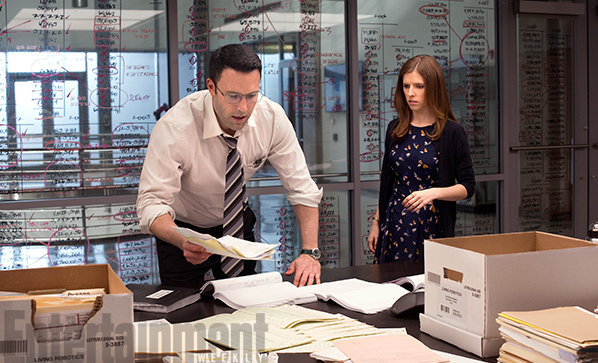Maybe the only other profession as “unsexy” as accountant is paralegal. There’s very little room in the field to finesse into, shall we say, an action movie. And yet, that’s exactly what Gavin O’Connor’s (fresh from directing Jane Got A Gun) aptly titled The Accountant ends up doing.
Written by Bill Dubuque, who only seems to enjoy naming his films after mostly banal professions (see: The Judge), The Accountant centers on seemingly mild-mannered Christian Wolff (Ben Affleck), who runs his firm, ZZZ Accounting (a real dig at the job, eh?), out of a strip mall in order to keep a low profile. But Wolff’s true specialty? Uncooking the books for major level crime organizations that need to cover their tracks using his expertise.
Opening with a flashback to Christian’s youth, and his first encounter with needing help for his increasingly displayed signs of autism, we’re introduced to Harbor Neuroscience Institute in New Hampshire, where his parents consult with the founding neurologist (Jason Davis) about options for his care. As his brother and only friend, Braxton (Jake Presley), looks on at Christian (Seth Lee) while he completes a puzzle with the image turned downward, their mother (Mary Kraft) urges Christian and Braxton’s military-beholden father (Robert C. Treveiler) to admit their son into the facility. The boys’ father, however, is not in agreement with the isolation method, insisting that Christian needs to learn how to exist in the world around him. At this point, the audience is briefly led to believe that Dubuque is going to paint Christian’s dad as the villain of his early life, but in an interesting shift, reveals that it’s his mother who ends up abandoning them when things prove too challenging.
This scarring abandonment prompts Christian and Braxton to embrace their father’s objectively harsh parenting methods–with such aphorisms as, “You’re either a victim or you’re not.” Christian ultimately chooses “not,” channeling his unique talents and eccentricities into accounting, with a criminal twist to stave off the boredom of the common life.
His latest client, Lamar Blackburn (John Lithgow, downplaying his abilities in this role), proves to be an unusual case that sets his suspicions on the CFO of the company, which specializes in the creation of prosthetic limbs. The junior accountant for Living Robotics, Dana Cummings (Anna Kendrick), who first discovered the discrepancy in the books pulls out all the files from every fiscal year so that Christian can go through them, which is how his introduction to her ends up being one that finds her asleep in the conference room. But, of course, because it’s Anna Kendrick-style, it’s charming rather than offputting–or at least that’s how you’re supposed to feel about it.
In spite of Dana’s best attempts to get through Christian’s stolid exterior, she ends up leaving to him his own devices to figure out where the disparity began. This doesn’t keep her from pursuing him on their lunch break, eventually breaking him down enough to admit that, yes, he does like the image of dogs playing poker.
Amid the backdrop of all this is an ominous “muscle” hired by an unknown corporate bigwig to keep the competition at bay. It is he who ends up offing the CFO, therefore prompting Lamar to take Christian out of the accounting equation–much to his dismay as part of his autism demands that he “has to finish” everything he starts. And then there is the mild problem of the director of financial crimes for the U.S. Treasury Department, Ray King (J.K. Simmons), pursuing him by hiring previously convicted felon Marybeth Medina (Cynthia Addai-Robinson) to unearth his true identity.
All of this intrigue tinged with just a hint of unrealized romance between Christian and Dana serves to make the accounting profession look more like The Bourne Identity as opposed to The Crucible.





















